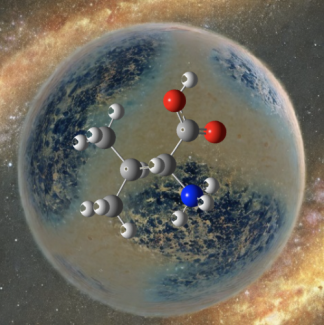Molecules that are a close precursor to living systems or that are most likely a result of biological activity can tell us whether there could be life on other worlds in our own solar system. Therefore, the capability to accurately identify and quantify such biomarkers, which may be found in the presence of a complex mixture of molecules and their isomers, is crucial for future life detection missions, e.g. to Europa or Titan. However, any complex molecule with a given atomic composition has other isomers, where the same atoms are connected in a different way, and these isomers may not be interpreted as biomarkers. Given this ambiguity of atomic composition, mass spectrometry alone cannot reliably determine whether a given molecule is a marker for possible biological activity, or simply a non-biogenic isomer. Additional information channels are therefore necessary to unambiguously identify biomarkers in planetary missions. Together with mass identifcation, infrared spectroscopy can yield this kind of structural information. In this project, funded through NASA’s Jet Propulsion Laboratory, we collaborate with JPL scientists, aiming to establish that vibrational spectra of messenger tagged ionic biomarkers (e.g., amino acids, fatty acids, nucleobases, sugars) can serve to unambiguously detect molecular biosignatures. You can read more about this project here (https://doi.org/10.1021/acs.jpca.4c03552).
We gratefully acknowledge funding from the NASA Jet Propulsion Laboratory for this research. _Logo.webp.png)



 The Physics Frontiers Centers (PFC) program supports university-based centers and institutes where the collective efforts of a larger group of individuals can enable transformational advances in the most promising research areas. The program is designed to foster major breakthroughs at the intellectual frontiers of physics by providing needed resources such as combinations of talents, skills, disciplines, and/or specialized infrastructure, not usually available to individual investigators or small groups, in an environment in which the collective efforts of the larger group can be shown to be seminal to promoting significant progress in the science and the education of students. PFCs also include creative, substantive activities aimed at enhancing education, broadening participation of traditionally underrepresented groups, and outreach to the scientific community and general public.
The Physics Frontiers Centers (PFC) program supports university-based centers and institutes where the collective efforts of a larger group of individuals can enable transformational advances in the most promising research areas. The program is designed to foster major breakthroughs at the intellectual frontiers of physics by providing needed resources such as combinations of talents, skills, disciplines, and/or specialized infrastructure, not usually available to individual investigators or small groups, in an environment in which the collective efforts of the larger group can be shown to be seminal to promoting significant progress in the science and the education of students. PFCs also include creative, substantive activities aimed at enhancing education, broadening participation of traditionally underrepresented groups, and outreach to the scientific community and general public.